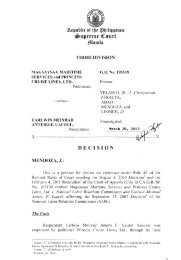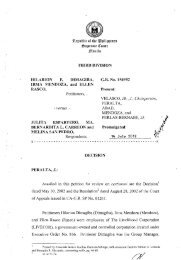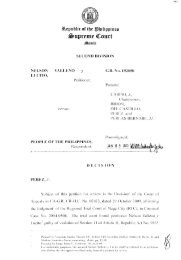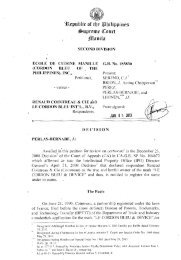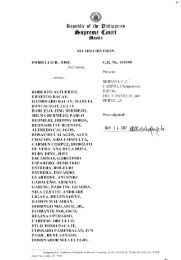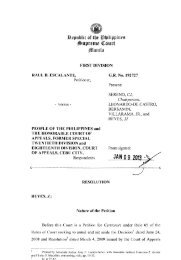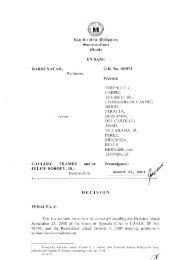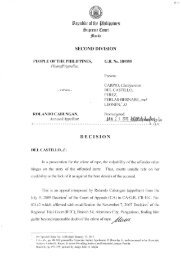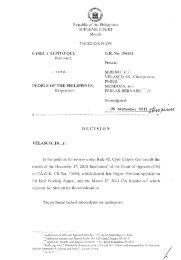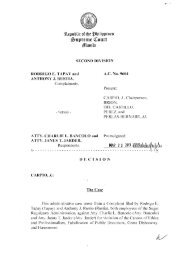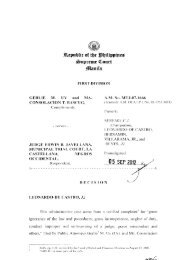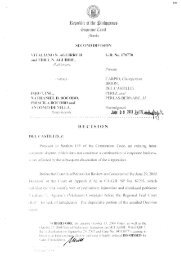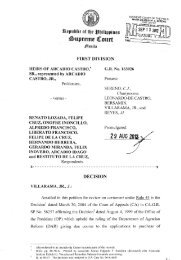G.R. Nos. 162144-54. November 13, 2012 - Supreme Court of the ...
G.R. Nos. 162144-54. November 13, 2012 - Supreme Court of the ...
G.R. Nos. 162144-54. November 13, 2012 - Supreme Court of the ...
Create successful ePaper yourself
Turn your PDF publications into a flip-book with our unique Google optimized e-Paper software.
EN BANC<br />
PEOPLE OF THE PHILIPPINES, G.R. <strong>Nos</strong>. <strong>162144</strong>-54<br />
Petitioner,<br />
Present:<br />
SERENO, C.J.,<br />
CARPIO,<br />
VELASCO, JR.,<br />
LEONARDO-DE CASTRO,<br />
BRION,<br />
- versus - PERALTA,<br />
BERSAMIN,<br />
DEL CASTILLO,<br />
ABAD,<br />
VILLARAMA, JR.,<br />
PEREZ,<br />
MENDOZA,<br />
REYES, and<br />
PERLAS-BERNABE, JJ.<br />
HON. MA. THERESA L. DELA TORRE-<br />
YADAO, in her capacity as Presiding<br />
Judge, Branch 81, Regional Trial <strong>Court</strong> <strong>of</strong><br />
Quezon City, HON. MA. NATIVIDAD M.<br />
DIZON, in her capacity as Executive<br />
Judge <strong>of</strong> <strong>the</strong> Regional Trial <strong>Court</strong> <strong>of</strong><br />
Quezon City, PANFILO M. LACSON,<br />
JEWEL F. CANSON, ROMEO M. ACOP,<br />
FRANCISCO G. ZUBIA, JR., MICHAEL<br />
RAY B. AQUINO, CEZAR O. MANCAO<br />
II, ZOROBABEL S. LAURELES,<br />
GLENN G. DUMLAO, ALMARIO A.<br />
HILARIO, JOSE ERWIN T.<br />
VILLACORTE, GIL C. MENESES,<br />
ROLANDO ANDUYAN, JOSELITO T.<br />
ESQUIVEL, RICARDO G. DANDAN,<br />
CEASAR TANNAGAN, VICENTE P.<br />
ARNADO, ROBERTO T. LANGCAUON,<br />
ANGELITO N. CAISIP, ANTONIO<br />
FRIAS, CICERO S. BACOLOD, WILLY
Decision 3<br />
G.R. <strong>Nos</strong>. <strong>162144</strong>-54<br />
suspected members <strong>of</strong> <strong>the</strong> Kuratong Baleleng Gang 2 along Commonwealth<br />
Avenue in Quezon City.<br />
Subsequently, SPO2 Eduardo Delos Reyes <strong>of</strong> <strong>the</strong> Criminal<br />
Investigation Command told <strong>the</strong> press that it was a summary execution, not a<br />
shoot-out between <strong>the</strong> police and those who were slain. After investigation,<br />
<strong>the</strong> Deputy Ombudsman for Military Affairs absolved all <strong>the</strong> police <strong>of</strong>ficers<br />
involved, including respondents Panfilo M. Lacson, Jewel F. Canson,<br />
Romeo M. Acop, Francisco G. Zubia, Jr., Michael Ray B. Aquino, Cezar O.<br />
Mancao II, and 28 o<strong>the</strong>rs (collectively, <strong>the</strong> respondents). 3 On review,<br />
however, <strong>the</strong> Office <strong>of</strong> <strong>the</strong> Ombudsman reversed <strong>the</strong> finding and filed<br />
charges <strong>of</strong> murder against <strong>the</strong> police <strong>of</strong>ficers involved before <strong>the</strong><br />
Sandiganbayan in Criminal Cases 23047 to 57, except that in <strong>the</strong> cases <strong>of</strong><br />
respondents Zubia, Acop, and Lacson, <strong>the</strong>ir liabilities were downgraded to<br />
mere accessory. On arraignment, Lacson pleaded not guilty.<br />
Upon respondents’ motion, <strong>the</strong> Sandiganbayan ordered <strong>the</strong> transfer <strong>of</strong><br />
<strong>the</strong>ir cases to <strong>the</strong> Regional Trial <strong>Court</strong> (RTC) <strong>of</strong> Quezon City on <strong>the</strong> ground<br />
that none <strong>of</strong> <strong>the</strong> principal accused had <strong>the</strong> rank <strong>of</strong> Chief Superintendent or<br />
higher. Pending <strong>the</strong> resolution <strong>of</strong> <strong>the</strong> Office <strong>of</strong> <strong>the</strong> Special Prosecutor’s<br />
motion for reconsideration <strong>of</strong> <strong>the</strong> transfer order, Congress passed Republic<br />
Act (R.A.) 8249 that expanded <strong>the</strong> Sandiganbayan’s jurisdiction by deleting<br />
<strong>the</strong> word “principal” from <strong>the</strong> phrase “principal accused” to apply to all<br />
pending cases where trial had not begun. As a result <strong>of</strong> this new law, <strong>the</strong><br />
Sandiganbayan opted to retain and try <strong>the</strong> Kuratong Baleleng murder cases.<br />
2 Namely: Manuel Montero, Rolando Siplon, Sherwyn Abalora, Ray Abalora, Joel Amora, Hilario Jevy<br />
Redillas, Meleubren Sorronda, Pacifico Montero, Jr., Welbor Elcamel, Carlito Alap-ap and Tirso Daig @<br />
Alex Neri.<br />
3 Namely: Zorobabel S. Laureles, Glenn G. Dumlao, Almario A. Hilario, Jose Erwin T. Villacorte, Gil C.<br />
Meneses, Rolando Anduyan, Joselito T. Esquivel, Ricardo G. Dandan, Ceasar Tannagan, Vicente P.<br />
Arnado, Roberto T. Langcauon, Angelito N. Caisip, Antonio Frias, Cicero S. Bacolod, Willy Nuas, Juanito<br />
B. Manaois, Virgilio V. Paragas, Rolando R. Jimenez, Cecilio T. Morito, Reynaldo C. Las Piñas, Wilfredo<br />
G. Cuartero, Roberto O. Agbalog, Osmundo B. Cariño, Norberto Lasaga, Leonardo Gloria, Alejandro G.<br />
Liwanag, Elmer Ferrer, and Romy Cruz.
Decision 4<br />
G.R. <strong>Nos</strong>. <strong>162144</strong>-54<br />
Respondent Lacson challenged <strong>the</strong> constitutionality <strong>of</strong> R.A. 8249 in<br />
G.R. 128096 4 but this <strong>Court</strong> upheld its validity. None<strong>the</strong>less, <strong>the</strong> <strong>Court</strong><br />
ordered <strong>the</strong> transfer <strong>of</strong> <strong>the</strong> trial <strong>of</strong> <strong>the</strong> cases to <strong>the</strong> RTC <strong>of</strong> Quezon City since<br />
<strong>the</strong> amended informations contained no allegations that respondents<br />
committed <strong>the</strong> <strong>of</strong>fenses charged in relation to, or in <strong>the</strong> discharge <strong>of</strong>, <strong>the</strong>ir<br />
<strong>of</strong>ficial functions as required by R.A. 8249.<br />
Before <strong>the</strong> RTC <strong>of</strong> Quezon City, Branch 81, <strong>the</strong>n presided over by<br />
Judge Wenceslao Agnir, Jr., could arraign respondents in <strong>the</strong> re-docketed<br />
Criminal Cases Q-99-81679 to 89, however, SPO2 Delos Reyes and <strong>the</strong><br />
o<strong>the</strong>r prosecution witnesses recanted <strong>the</strong>ir affidavits. Some <strong>of</strong> <strong>the</strong> victims’<br />
heirs also executed affidavits <strong>of</strong> desistance. These prompted <strong>the</strong> respondents<br />
to file separate motions for <strong>the</strong> determination <strong>of</strong> probable cause before <strong>the</strong><br />
issuance <strong>of</strong> warrants <strong>of</strong> arrests.<br />
On March 29, 1999 <strong>the</strong> RTC <strong>of</strong> Quezon City ordered <strong>the</strong> provisional<br />
dismissal <strong>of</strong> <strong>the</strong> cases for lack <strong>of</strong> probable cause to hold <strong>the</strong> accused for trial<br />
following <strong>the</strong> recantation <strong>of</strong> <strong>the</strong> principal prosecution witnesses and <strong>the</strong><br />
desistance <strong>of</strong> <strong>the</strong> private complainants.<br />
Two years later or on March 27, 2001 PNP Director Leandro R.<br />
Mendoza sought to revive <strong>the</strong> cases against respondents by requesting <strong>the</strong><br />
Department <strong>of</strong> Justice (DOJ) to conduct ano<strong>the</strong>r preliminary investigation in<br />
<strong>the</strong>ir cases on <strong>the</strong> strength <strong>of</strong> <strong>the</strong> affidavits <strong>of</strong> P/Insp. Ysmael S. Yu and P/S<br />
Insp. Abelardo Ramos. In response, <strong>the</strong>n DOJ Secretary Hernando B. Perez<br />
constituted a panel <strong>of</strong> prosecutors to conduct <strong>the</strong> requested investigation.<br />
Invoking <strong>the</strong>ir constitutional right against double jeopardy, Lacson<br />
4 Lacson v. The Executive Secretary, supra note 1.
Decision 5<br />
G.R. <strong>Nos</strong>. <strong>162144</strong>-54<br />
and his co-accused filed a petition for prohibition with application for<br />
temporary restraining order and writ <strong>of</strong> preliminary injunction before <strong>the</strong><br />
RTC <strong>of</strong> Manila in Civil Case 01-100933. In an Order dated June 5, 2001,<br />
that court denied <strong>the</strong> plea for temporary restraining order. Thus, on June 6,<br />
2001 <strong>the</strong> panel <strong>of</strong> prosecutors found probable cause to hold Lacson and his<br />
co-accused liable as principals for 11 counts <strong>of</strong> murder, resulting in <strong>the</strong> filing<br />
<strong>of</strong> separate informations against <strong>the</strong>m in Criminal Cases 01-101102 to 12<br />
before <strong>the</strong> RTC <strong>of</strong> Quezon City, Branch 81, now presided over by<br />
respondent Judge Ma. Theresa L. Yadao.<br />
On <strong>the</strong> same day, respondent Lacson filed a petition for certiorari<br />
before <strong>the</strong> <strong>Court</strong> <strong>of</strong> Appeals (CA), assailing <strong>the</strong> RTC <strong>of</strong> Manila’s order<br />
which allowed <strong>the</strong> renewed preliminary investigation <strong>of</strong> <strong>the</strong> murder charges<br />
against him and his co-accused. Lacson also filed with <strong>the</strong> RTC <strong>of</strong> Quezon<br />
City a motion for judicial determination <strong>of</strong> probable cause. But on June <strong>13</strong>,<br />
2001 he sought <strong>the</strong> suspension <strong>of</strong> <strong>the</strong> proceedings in that court.<br />
In <strong>the</strong> meantime, <strong>the</strong> CA issued a temporary restraining order<br />
enjoining <strong>the</strong> RTC <strong>of</strong> Quezon City from issuing warrants <strong>of</strong> arrest or<br />
conducting any proceeding in Criminal Cases 01-101102 to 12 before it. On<br />
August 24, 2001 <strong>the</strong> CA rendered a Decision, granting Lacson’s petition on<br />
<strong>the</strong> ground <strong>of</strong> double jeopardy since, although <strong>the</strong> dismissal <strong>of</strong> Criminal<br />
Cases Q-99-81679 to 89 was provisional, such dismissal became permanent<br />
two years after when <strong>the</strong>y were not revived.<br />
Upon <strong>the</strong> prosecution’s appeal to this <strong>Court</strong> in G.R. 149453, 5 <strong>the</strong> <strong>Court</strong><br />
ruled that, based on <strong>the</strong> record, Lacson failed to prove compliance with <strong>the</strong><br />
requirements <strong>of</strong> Section 8, Rule 117 governing provisional dismissals. The<br />
records showed that <strong>the</strong> prosecution did not file a motion for provisional<br />
5 People v. Lacson, supra note 1.
Decision 6<br />
G.R. <strong>Nos</strong>. <strong>162144</strong>-54<br />
dismissal and, for his part, respondent Lacson had merely filed a motion for<br />
judicial determination <strong>of</strong> probable cause. Nowhere did he agree to some<br />
proposal for a provisional dismissal <strong>of</strong> <strong>the</strong> cases. Fur<strong>the</strong>rmore, <strong>the</strong> heirs <strong>of</strong><br />
<strong>the</strong> victims had no notice <strong>of</strong> any motion for such provisional dismissal.<br />
The <strong>Court</strong> thus set aside <strong>the</strong> CA Decision <strong>of</strong> August 24, 2001 and<br />
directed <strong>the</strong> RTC <strong>of</strong> Quezon City to try <strong>the</strong> cases with dispatch. On motion<br />
for reconsideration by respondent Lacson, <strong>the</strong> <strong>Court</strong> ordered <strong>the</strong> re-raffle <strong>of</strong><br />
<strong>the</strong> criminal cases to a heinous crimes court. Upon re-raffle, however, <strong>the</strong><br />
cases still went to Branch 81, which as already stated was now presided over<br />
by Judge Yadao.<br />
On October 12, 2003 <strong>the</strong> parents <strong>of</strong> two <strong>of</strong> <strong>the</strong> victims submitted birth<br />
certificates showing that <strong>the</strong>y were minors. Apparently reacting to this, <strong>the</strong><br />
prosecution amended <strong>the</strong> informations to show such minority and asked<br />
respondent Executive Judge Ma. Natividad M. Dizon to recall <strong>the</strong><br />
assignment <strong>of</strong> <strong>the</strong> cases to Branch 81 and re-raffle <strong>the</strong>m to a family court.<br />
The request for recall was denied.<br />
On October 20, 2003 <strong>the</strong> prosecution filed an omnibus motion before<br />
Branch 81, praying for <strong>the</strong> re-raffle <strong>of</strong> Criminal Cases 01-101102 to12 to <strong>the</strong><br />
family courts in view <strong>of</strong> <strong>the</strong> changes in <strong>the</strong> two informations. On October<br />
24, 2003 <strong>the</strong> prosecution also filed its consolidated comment ex-abundanti<br />
cautela on <strong>the</strong> motions to determine probable cause.<br />
On <strong>November</strong> 12, 2003 6 Judge Yadao issued an order, denying <strong>the</strong><br />
prosecution’s motion for re-raffle to a family court on <strong>the</strong> ground that<br />
Section 5 <strong>of</strong> R.A. 8369 applied only to living minors. She also granted <strong>the</strong><br />
motions for determination <strong>of</strong> probable cause and dismissed <strong>the</strong> cases against<br />
6 Rollo, Vol. I, pp. 235-251.
Decision 7<br />
G.R. <strong>Nos</strong>. <strong>162144</strong>-54<br />
<strong>the</strong> respondents since <strong>the</strong> affidavits <strong>of</strong> <strong>the</strong> prosecution witnesses were<br />
inconsistent with those <strong>the</strong>y submitted in <strong>the</strong> preliminary investigations<br />
before <strong>the</strong> Ombudsman for <strong>the</strong> crime <strong>of</strong> robbery.<br />
On <strong>November</strong> 25, 2003 <strong>the</strong> prosecution filed a verified motion to<br />
recuse or disqualify Judge Yadao and for reconsideration <strong>of</strong> her order. It also<br />
filed an administrative complaint against her for dishonesty, conduct<br />
prejudicial to <strong>the</strong> best interests <strong>of</strong> <strong>the</strong> service, manifest partiality, and<br />
knowingly rendering an unjust judgment. 7 On January 14, 2004, <strong>the</strong><br />
prosecution filed an urgent supplemental motion for compulsory<br />
disqualification with motion for cancellation <strong>of</strong> <strong>the</strong> hearing on motion for<br />
reconsideration.<br />
On January 21, 2004 Judge Yadao issued an order, denying <strong>the</strong> motion<br />
to recuse her, prompting <strong>the</strong> prosecution to appeal from that order. Fur<strong>the</strong>r,<br />
on January 22, 2004 Judge Yadao issued ano<strong>the</strong>r order, denying <strong>the</strong><br />
prosecution’s motion for reconsideration <strong>of</strong> <strong>the</strong> Order dated <strong>November</strong> 12,<br />
2003 that dismissed <strong>the</strong> action against <strong>the</strong> respondents. In response, <strong>the</strong><br />
prosecution filed a notice <strong>of</strong> appeal from <strong>the</strong> same. Finally, on January 26,<br />
2004 Judge Yadao issued an order, denying <strong>the</strong> prosecution’s motion for<br />
reconsideration <strong>of</strong> its January 16, 2004 Order not only for lack <strong>of</strong> merit but<br />
also for having become moot and academic.<br />
On February 16, 2004 <strong>the</strong> prosecution withdrew ex-abundanti cautela<br />
<strong>the</strong> notices <strong>of</strong> appeal that it filed in <strong>the</strong> cases. Subsequently, on March 3,<br />
2004 it filed <strong>the</strong> present special civil action <strong>of</strong> certiorari.<br />
The Issues Presented<br />
The prosecution presents <strong>the</strong> following issues:<br />
7 Id., Vol. II, pp. 768-796; Dismissed on May 17, 2004, see rollo, Vol. IV, pp. 3225-3226.
Decision 8<br />
G.R. <strong>Nos</strong>. <strong>162144</strong>-54<br />
1. Whe<strong>the</strong>r or not Executive Judge Dizon gravely abused her<br />
discretion in allowing Criminal Cases 01-101102 to 12 to be reraffled<br />
to o<strong>the</strong>r than among <strong>the</strong> RTC <strong>of</strong> Quezon City’s family<br />
courts.<br />
2. Whe<strong>the</strong>r or not Judge Yadao gravely abused her discretion<br />
when she took cognizance <strong>of</strong> Criminal Cases 01-101102 to 12<br />
contrary to <strong>the</strong> prosecution’s view that such cases fell under <strong>the</strong><br />
jurisdiction <strong>of</strong> family courts.<br />
3. Whe<strong>the</strong>r or not Judge Yadao gravely abused her discretion<br />
when she did not inhibit and disqualify herself from taking<br />
cognizance <strong>of</strong> <strong>the</strong> cases.<br />
4. Whe<strong>the</strong>r or not Judge Yadao gravely abused her discretion<br />
when she dismissed <strong>the</strong> criminal actions on <strong>the</strong> ground <strong>of</strong> lack<br />
<strong>of</strong> probable cause and barred <strong>the</strong> presentation <strong>of</strong> additional<br />
evidence in support <strong>of</strong> <strong>the</strong> prosecution’s motion for<br />
reconsideration.<br />
5. Whe<strong>the</strong>r or not Judge Yadao gravely abused her discretion<br />
when she adopted certain policies concerning <strong>the</strong> conduct <strong>of</strong><br />
hearings in her court.<br />
The <strong>Court</strong>’s Rulings<br />
Before addressing <strong>the</strong> above issues, <strong>the</strong> <strong>Court</strong> notes respondents’<br />
contention that <strong>the</strong> prosecution’s resort to special civil action <strong>of</strong> certiorari<br />
under Rule 65 is improper. Since <strong>the</strong> trial court dismissed <strong>the</strong> criminal<br />
actions against respondents, <strong>the</strong> prosecution’s remedy was to appeal to <strong>the</strong><br />
CA from that order <strong>of</strong> dismissal.<br />
Ordinarily, <strong>the</strong> proper remedy from an order dismissing an action is an<br />
appeal. 8 Here, <strong>the</strong> prosecution in fact filed a notice <strong>of</strong> appeal from such an<br />
order issued in <strong>the</strong> subject cases. But it reconsidered its action and withdrew<br />
that notice, believing that appeal was not an effective, speedy, and adequate<br />
8 Santos v. Orda, Jr., G.R. No. 189402, May 6, 2010, 620 SCRA 375, 383.
Decision 9<br />
G.R. <strong>Nos</strong>. <strong>162144</strong>-54<br />
remedy. 9 In o<strong>the</strong>r words, <strong>the</strong> prosecution’s move was not a case <strong>of</strong> forgotten<br />
remedy but a conscious resort to ano<strong>the</strong>r based on a belief that respondent<br />
Judge Yadao gravely abused her discretion in issuing her various orders and<br />
that certiorari under Rule 65 was <strong>the</strong> proper and all-encompassing remedy<br />
for <strong>the</strong> prosecution. The <strong>Court</strong> is not prepared to say that <strong>the</strong> remedy is<br />
altoge<strong>the</strong>r implausible as to throw out <strong>the</strong> petition outright.<br />
Still, <strong>the</strong> <strong>Court</strong> notes that <strong>the</strong> prosecution skipped <strong>the</strong> CA and filed its<br />
action directly with this <strong>Court</strong>, ignoring <strong>the</strong> principle <strong>of</strong> judicial hierarchy <strong>of</strong><br />
courts. Although <strong>the</strong> <strong>Supreme</strong> <strong>Court</strong>, <strong>the</strong> CA, and <strong>the</strong> RTCs have concurrent<br />
jurisdiction to issue a writ <strong>of</strong> certiorari, such concurrence does not give <strong>the</strong><br />
People <strong>the</strong> unrestricted freedom <strong>of</strong> choice <strong>of</strong> forum. 10 In any case, <strong>the</strong><br />
immense public interest in <strong>the</strong>se cases, <strong>the</strong> considerable length <strong>of</strong> time that<br />
has passed since <strong>the</strong> crime took place, and <strong>the</strong> numerous times <strong>the</strong>se cases<br />
have come before this <strong>Court</strong> probably warrant a waiver <strong>of</strong> such procedural<br />
lapse.<br />
1. Raffle <strong>of</strong> <strong>the</strong> Cases<br />
The prosecution points out that <strong>the</strong> RTC <strong>of</strong> Quezon City Executive<br />
Judge gravely abused her discretion when she placed Criminal Cases 01-<br />
101102 to 12 under a separate category which did not restrict <strong>the</strong>ir raffle to<br />
<strong>the</strong> city’s special criminal and family courts in accordance with SC<br />
Administrative Order 36-96. Fur<strong>the</strong>r, <strong>the</strong> prosecution points out that she<br />
violated Administrative Order 19-98 when Branches 219 and 102 were left<br />
out <strong>of</strong> <strong>the</strong> raffle. The presiding judges <strong>of</strong> <strong>the</strong>se two branches, both heinous<br />
crimes courts eligible to receive cases by raffle, had just been appointed to<br />
<strong>the</strong> CA.<br />
9 Rollo, Vol. II, p. 1244.<br />
10 AAA v. Carbonell, G.R. No. 171465, June 8, 2007, 524 SCRA 496, 506.
Decision 10<br />
G.R. <strong>Nos</strong>. <strong>162144</strong>-54<br />
The records <strong>of</strong> <strong>the</strong> cases show nothing irregular in <strong>the</strong> conduct <strong>of</strong> <strong>the</strong><br />
raffle <strong>of</strong> <strong>the</strong> subject cases. The raffle maintained a separate list for criminal<br />
and civil cases. Criminal cases cognizable by special criminal courts were<br />
separately listed. Criminal Cases 01-101102 to 12 were given a separate<br />
heading, “Re-Raffle,” but <strong>the</strong>re was nothing irregular in this since it merely<br />
indicated that <strong>the</strong> cases were not being raffled for <strong>the</strong> first time.<br />
The Executive Judge did not err in leaving out Branches 219 and 102<br />
from raffle since <strong>the</strong>se branches remained without regularly appointed<br />
judges. Although <strong>the</strong> pairing judges <strong>of</strong> <strong>the</strong>se branches had authority to act<br />
on incidental, interlocutory, and urgent matters, this did not mean that such<br />
branches should already be included in <strong>the</strong> raffle <strong>of</strong> cases.<br />
Paren<strong>the</strong>tically, <strong>the</strong> prosecution was represented during <strong>the</strong> raffle yet it<br />
did not <strong>the</strong>n object to <strong>the</strong> manner by which it was conducted. The<br />
prosecution raised <strong>the</strong> question only when it filed this petition, a clear<br />
afterthought.<br />
2. Jurisdiction <strong>of</strong> Family <strong>Court</strong>s<br />
The prosecution points out that, although this <strong>Court</strong>’s October 7, 2003<br />
Resolution directed a re-raffle <strong>of</strong> <strong>the</strong> cases to a heinous crimes court, <strong>the</strong><br />
prosecution in <strong>the</strong> meantime amended <strong>the</strong> informations to reflect <strong>the</strong> fact that<br />
two <strong>of</strong> <strong>the</strong> murder victims were minors. For this reason, <strong>the</strong> Executive Judge<br />
should have raffled <strong>the</strong> cases to a family court pursuant to Section 5 <strong>of</strong> R.A.<br />
8369.<br />
The <strong>Court</strong> is not impervious to <strong>the</strong> provisions <strong>of</strong> Section 5 <strong>of</strong> R.A.<br />
8369, that vests in family courts jurisdiction over violations <strong>of</strong> R.A. 7610,<br />
which in turn covers murder cases where <strong>the</strong> victim is a minor. Thus:
Decision 11<br />
G.R. <strong>Nos</strong>. <strong>162144</strong>-54<br />
Sec. 5. Jurisdiction <strong>of</strong> Family <strong>Court</strong>s. – The Family <strong>Court</strong>s shall<br />
have exclusive original jurisdiction to hear and decide <strong>the</strong> following cases:<br />
a) Criminal cases where one or more <strong>of</strong> <strong>the</strong> accused is below<br />
eighteen (18) years <strong>of</strong> age but not less than nine (9) years <strong>of</strong> age, or where<br />
one or more <strong>of</strong> <strong>the</strong> victims is a minor at <strong>the</strong> time <strong>of</strong> <strong>the</strong> commission <strong>of</strong><br />
<strong>the</strong> <strong>of</strong>fense: Provided, That if <strong>the</strong> minor is found guilty, <strong>the</strong> court shall<br />
promulgate sentence and ascertain any civil liability which <strong>the</strong> respondent<br />
may have incurred. (Emphasis supplied)<br />
Undoubtedly, in vesting in family courts exclusive original<br />
jurisdiction over criminal cases involving minors, <strong>the</strong> law but seeks to<br />
protect <strong>the</strong>ir welfare and best interests. For this reason, when <strong>the</strong> need for<br />
such protection is not compromised, <strong>the</strong> <strong>Court</strong> is able to relax <strong>the</strong> rule. In<br />
several cases, 11 for instance, <strong>the</strong> <strong>Court</strong> has held that <strong>the</strong> CA enjoys<br />
concurrent jurisdiction with <strong>the</strong> family courts in hearing petitions for habeas<br />
corpus involving minors.<br />
Here, <strong>the</strong> two minor victims, for whose interests <strong>the</strong> people wanted<br />
<strong>the</strong> murder cases moved to a family court, are dead. As respondents aptly<br />
point out, <strong>the</strong>re is no living minor in <strong>the</strong> murder cases that require <strong>the</strong> special<br />
attention and protection <strong>of</strong> a family court. In fact, no minor would appear as<br />
party in those cases during trial since <strong>the</strong> minor victims are represented by<br />
<strong>the</strong>ir parents who had become <strong>the</strong> real private <strong>of</strong>fended parties.<br />
3. Inhibition <strong>of</strong> Judge Yadao<br />
The prosecution claims that Judge Yadao committed grave abuse <strong>of</strong><br />
discretion in failing to inhibit herself from hearing <strong>the</strong> cases against <strong>the</strong><br />
respondents.<br />
The rules governing <strong>the</strong> disqualification <strong>of</strong> judges are found, first, in<br />
Section 1, Rule <strong>13</strong>7 <strong>of</strong> <strong>the</strong> Rules <strong>of</strong> <strong>Court</strong>, which provides:<br />
11<br />
Madriñan v. Madriñan, G.R. No. 159374, July 12, 2007, 527 SCRA 487; Thornton v. Thornton, 480<br />
Phil. 224 (2004).
Decision 12<br />
G.R. <strong>Nos</strong>. <strong>162144</strong>-54<br />
Sec. 1. Disqualification <strong>of</strong> judges. – No judge or judicial <strong>of</strong>ficer<br />
shall sit in any case in which he, or his wife or child, is pecuniarily<br />
interested as heir, legatee, creditor or o<strong>the</strong>rwise, or in which he is related<br />
to ei<strong>the</strong>r party within <strong>the</strong> sixth degree <strong>of</strong> consanguinity or affinity, or to<br />
counsel within <strong>the</strong> fourth degree, computed according to <strong>the</strong> rules <strong>of</strong> <strong>the</strong><br />
civil law, or in which he has been executor, administrator, guardian,<br />
trustee or counsel, or in which he has presided in any inferior court when<br />
his ruling or decision is <strong>the</strong> subject <strong>of</strong> review, without <strong>the</strong> written consent<br />
<strong>of</strong> all parties in interest, signed by <strong>the</strong>m and entered upon <strong>the</strong> record.<br />
A judge may, in <strong>the</strong> exercise <strong>of</strong> his sound discretion, disqualify<br />
himself from sitting in a case, for just or valid reasons o<strong>the</strong>r than those<br />
mentioned above.<br />
and in Rule 3.12, Canon 3 <strong>of</strong> <strong>the</strong> Code <strong>of</strong> Judicial Conduct, which states:<br />
Rule 3.12. – A judge should take no part in a proceeding where <strong>the</strong><br />
judge’s impartiality might reasonably be questioned. These cases include<br />
among o<strong>the</strong>rs, proceedings where:<br />
(a) <strong>the</strong> judge has personal knowledge <strong>of</strong> disputed evidentiary<br />
facts concerning <strong>the</strong> proceeding;<br />
x x x x<br />
(e) <strong>the</strong> judge knows <strong>the</strong> judge’s spouse or child has a financial<br />
interest, as heir, legatee, creditor, fiduciary, or o<strong>the</strong>rwise, in <strong>the</strong> subject<br />
matter in controversy or in a party to <strong>the</strong> proceeding, or any o<strong>the</strong>r interest<br />
that could be substantially affected by <strong>the</strong> outcome <strong>of</strong> <strong>the</strong> proceeding. In<br />
every instance, <strong>the</strong> judge shall indicate <strong>the</strong> legal reason for inhibition.<br />
The first paragraph <strong>of</strong> Section 1, Rule <strong>13</strong>7 and Rule 3.12, Canon 3<br />
provide for <strong>the</strong> compulsory disqualification <strong>of</strong> a judge while <strong>the</strong> second<br />
paragraph <strong>of</strong> Section 1, Rule <strong>13</strong>7 provides for his voluntary inhibition.<br />
The matter <strong>of</strong> voluntary inhibition is primarily a matter <strong>of</strong> conscience<br />
and sound discretion on <strong>the</strong> part <strong>of</strong> <strong>the</strong> judge since he is in a better position<br />
to determine whe<strong>the</strong>r a given situation would unfairly affect his attitude<br />
towards <strong>the</strong> parties or <strong>the</strong>ir cases. The mere imputation <strong>of</strong> bias, partiality,<br />
and prejudgment is not enough ground, absent clear and convincing<br />
evidence that can overcome <strong>the</strong> presumption that <strong>the</strong> judge will perform his
Decision <strong>13</strong><br />
G.R. <strong>Nos</strong>. <strong>162144</strong>-54<br />
duties according to law without fear or favor. The <strong>Court</strong> will not disqualify<br />
a judge based on speculations and surmises or <strong>the</strong> adverse nature <strong>of</strong> <strong>the</strong><br />
judge’s rulings towards those who seek to inhibit him. 12<br />
Here, <strong>the</strong> prosecution contends that Judge Yadao should have<br />
inhibited herself for improperly submitting to a public interview on <strong>the</strong> day<br />
following her dismissal <strong>of</strong> <strong>the</strong> criminal cases against <strong>the</strong> respondents. But<br />
<strong>the</strong> <strong>Court</strong> finds nothing basically reprehensible in such interview. Judge<br />
Yadao’s dismissal <strong>of</strong> <strong>the</strong> multiple murder cases aroused natural public<br />
interest and stirred <strong>the</strong> media into frenzy for correct information. Judge<br />
Yadao simply accommodated, not sought, <strong>the</strong> requests for such an interview<br />
to clarify <strong>the</strong> basis <strong>of</strong> her order. There is no allegation that she gave out false<br />
information. To be sure, <strong>the</strong> prosecution never once accused her <strong>of</strong> making<br />
public disclosures regarding <strong>the</strong> merits <strong>of</strong> those cases prior to her order<br />
dismissing such cases.<br />
The prosecution also assails as constituting bias Judge Yadao’s<br />
statement that a very close relative stood to be promoted if she was to issue a<br />
warrant <strong>of</strong> arrest against <strong>the</strong> respondents. But this statement merely shows<br />
that she cannot be dissuaded by some relative who is close to her. How can<br />
this constitute bias? Besides, <strong>the</strong>re is no evidence that <strong>the</strong> close relative she<br />
referred to was her spouse or child which would be a mandatory ground for<br />
disqualification.<br />
Fur<strong>the</strong>r, <strong>the</strong> prosecution claims that Judge Yadao prejudged its motion<br />
for reconsideration when she said in her comment to <strong>the</strong> administrative<br />
complaint against her that such motion was merely <strong>the</strong> prosecution’s<br />
stubborn insistence on <strong>the</strong> existence <strong>of</strong> probable cause against <strong>the</strong><br />
respondents. The comment could <strong>of</strong> course not be regarded as a<br />
12 Spouses Abrajano v. Heirs <strong>of</strong> Augusto F. Salas, Jr., 517 Phil. 663, 674-675 (2006).
Decision 14<br />
G.R. <strong>Nos</strong>. <strong>162144</strong>-54<br />
prejudgment <strong>of</strong> <strong>the</strong> issue since she had precisely already issued an order<br />
holding that <strong>the</strong> complainant’s evidence failed to establish probable cause<br />
against <strong>the</strong> respondents. And <strong>the</strong>re is nothing wrong about characterizing a<br />
motion for reconsideration as a “stubborn” position taken by <strong>the</strong> party who<br />
filed it. Judge Yadao did not characterize <strong>the</strong> motion as wholly unjustified at<br />
<strong>the</strong> time she filed her comment.<br />
4. Dismissal <strong>of</strong> <strong>the</strong> Criminal Cases<br />
The prosecution claims that Judge Yadao gravely abused her<br />
discretion when she set <strong>the</strong> motions for determination <strong>of</strong> probable cause for<br />
hearing, deferred <strong>the</strong> issuance <strong>of</strong> warrants <strong>of</strong> arrest, and allowed <strong>the</strong> defense<br />
to mark its evidence and argue its case. The prosecution stresses that under<br />
Section 6, Rule 112 <strong>of</strong> <strong>the</strong> Rules <strong>of</strong> <strong>Court</strong> Judge Yadao’s duty was to<br />
determine probable cause for <strong>the</strong> purpose <strong>of</strong> issuing <strong>the</strong> arrest warrants<br />
solely on <strong>the</strong> basis <strong>of</strong> <strong>the</strong> investigating prosecutor’s resolution as well as <strong>the</strong><br />
informations and <strong>the</strong>ir supporting documents. And, if she had some doubts<br />
as to <strong>the</strong> existence <strong>of</strong> probable cause, <strong>the</strong> rules required her to order <strong>the</strong><br />
investigating prosecutor to present additional evidence to support <strong>the</strong> finding<br />
<strong>of</strong> probable cause within five days from notice.<br />
Ra<strong>the</strong>r than take limited action, said <strong>the</strong> prosecution, Judge Yadao dug<br />
up and adopted <strong>the</strong> Ombudsman’s findings when <strong>the</strong> latter conducted its<br />
preliminary investigation <strong>of</strong> <strong>the</strong> crime <strong>of</strong> robbery in 1996. Judge Yadao gave<br />
weight to <strong>the</strong> affidavits submitted in that earlier preliminary investigation<br />
when such documents are proper for presentation during <strong>the</strong> trial <strong>of</strong> <strong>the</strong><br />
cases. The prosecution added that <strong>the</strong> affidavits <strong>of</strong> P/S Insp. Abelardo<br />
Ramos and SPO1 Wilmor B. Medes reasonably explained <strong>the</strong> prior<br />
inconsistent affidavits <strong>the</strong>y submitted before <strong>the</strong> Ombudsman.
Decision 15<br />
G.R. <strong>Nos</strong>. <strong>162144</strong>-54<br />
The general rule <strong>of</strong> course is that <strong>the</strong> judge is not required, when<br />
determining probable cause for <strong>the</strong> issuance <strong>of</strong> warrants <strong>of</strong> arrests, to<br />
conduct a de novo hearing. The judge only needs to personally review <strong>the</strong><br />
initial determination <strong>of</strong> <strong>the</strong> prosecutor finding a probable cause to see if it is<br />
supported by substantial evidence. <strong>13</strong><br />
But here, <strong>the</strong> prosecution conceded that <strong>the</strong>ir own witnesses tried to<br />
explain in <strong>the</strong>ir new affidavits <strong>the</strong> inconsistent statements that <strong>the</strong>y earlier<br />
submitted to <strong>the</strong> Office <strong>of</strong> <strong>the</strong> Ombudsman. Consequently, it was not<br />
unreasonable for Judge Yadao, for <strong>the</strong> purpose <strong>of</strong> determining probable<br />
cause based on those affidavits, to hold a hearing and examine <strong>the</strong><br />
inconsistent statements and related documents that <strong>the</strong> witnesses <strong>the</strong>mselves<br />
brought up and were part <strong>of</strong> <strong>the</strong> records. Besides, she received no new<br />
evidence from <strong>the</strong> respondents. 14<br />
The public prosecutor submitted <strong>the</strong> following affidavits and<br />
documents along with <strong>the</strong> criminal informations to enable Judge Yadao to<br />
determine <strong>the</strong> presence <strong>of</strong> probable cause against <strong>the</strong> respondents:<br />
1. P/Insp. Ysmael S. Yu’s affidavit <strong>of</strong> March 24, 2001 15 in which<br />
he said that on May 17, 1995 respondent Canson, NCR Command Head,<br />
ordered him to form two teams that would go after suspected Kuratong<br />
Baleleng Gang members who were seen at <strong>the</strong> Superville Subdivision in<br />
Parañaque City. Yu headed <strong>the</strong> assault team while Marlon Sapla headed <strong>the</strong><br />
perimeter defense. After <strong>the</strong> police team apprehended eight men inside <strong>the</strong><br />
safe house, it turned <strong>the</strong>m over to <strong>the</strong>ir investigating unit. The following<br />
day, Yu just learned that <strong>the</strong> men and three o<strong>the</strong>rs were killed in a shoot-out<br />
with <strong>the</strong> police in Commonwealth Avenue in Quezon City.<br />
<strong>13</strong> AAA v. Carbonell, supra note 10, at 508-509; De Joya v. Judge Marquez, 516 Phil. 717, 722 (2006).<br />
14 Rollo, Vol. I, pp. 235-251.<br />
15 Id. at 600-601.
Decision 16<br />
G.R. <strong>Nos</strong>. <strong>162144</strong>-54<br />
2. P/S Insp. Abelardo Ramos’ affidavit <strong>of</strong> March 24, 2001 16 in<br />
which he said that he was part <strong>of</strong> <strong>the</strong> perimeter defense during <strong>the</strong> Superville<br />
operation. After <strong>the</strong> assault team apprehended eight male suspects, it<br />
brought <strong>the</strong>m to Camp Crame in two vans. Ramos <strong>the</strong>n went to <strong>the</strong> <strong>of</strong>fice <strong>of</strong><br />
respondent Zubia, TMC Head, where he saw respondents Lacson, Acop,<br />
Laureles, Villacorte and o<strong>the</strong>r police <strong>of</strong>ficers.<br />
According to Ramos, Zubia said that <strong>the</strong> eight suspects were to be<br />
brought to Commonwealth Avenue and killed in a supposed shoot-out and<br />
that this action had been cleared with higher authorities, to which remark<br />
Lacson nodded as a sign <strong>of</strong> approval. Before Ramos left <strong>the</strong> meeting,<br />
Lacson supposedly told him, “baka may mabuhay pa diyan.” Ramos <strong>the</strong>n<br />
boarded an L-300 van with his men and four male suspects. In <strong>the</strong> early<br />
morning <strong>of</strong> May 18, 1995, <strong>the</strong>y executed <strong>the</strong> plan and gunned down <strong>the</strong><br />
suspects. A few minutes later, P/S Insp. Glenn G. Dumlao and his men<br />
arrived and claimed responsibility for <strong>the</strong> incident.<br />
3. SPO1 Wilmor B. Medes’ affidavit <strong>of</strong> April 24, 2001 17 in which<br />
he corroborated Ramos’ statements. Medes said that he belonged to <strong>the</strong><br />
same team that arrested <strong>the</strong> eight male suspects. He drove <strong>the</strong> L-300 van in<br />
going to Commonwealth Avenue where <strong>the</strong> suspects were killed.<br />
4. Mario C. Enad’s affidavit <strong>of</strong> August 8, 1995 18 in which he<br />
claimed having served as TMC civilian agent. At around noon <strong>of</strong> May 17,<br />
1995, he went to Superville Subdivision toge<strong>the</strong>r with respondents Dumlao,<br />
Tannagan, and Nuas. Dumlao told Enad to stay in <strong>the</strong> car and observe what<br />
went on in <strong>the</strong> house under surveillance. Later that night, o<strong>the</strong>r police<br />
16 Id. at 632-634.<br />
17 Id. at 665-666.<br />
18 Id. at 667-675.
Decision 17<br />
G.R. <strong>Nos</strong>. <strong>162144</strong>-54<br />
<strong>of</strong>ficers arrived and apprehended <strong>the</strong> men in <strong>the</strong> house. Enad went in and<br />
saw six men lying on <strong>the</strong> floor while <strong>the</strong> o<strong>the</strong>rs were handcuffed. Enad and<br />
his companions left Sucat in <strong>the</strong> early morning <strong>of</strong> May 18, 1995. He fell<br />
asleep along <strong>the</strong> way but was awaken by gunshots. He saw Dumlao and<br />
o<strong>the</strong>r police <strong>of</strong>ficers fire <strong>the</strong>ir guns at <strong>the</strong> L-300 van containing <strong>the</strong><br />
apprehended suspects.<br />
5. SPO2 Noel P. Seno’s affidavit <strong>of</strong> May 31, 2001 19 in which he<br />
corroborated what Ramos said. Seno claimed that he was part <strong>of</strong> <strong>the</strong><br />
advance party in Superville Subdivision and was also in Commonwealth<br />
Avenue when <strong>the</strong> suspected members <strong>of</strong> <strong>the</strong> Kuratong Baleleng Gang were<br />
killed.<br />
6. The PNP ABRITG After Operations Report <strong>of</strong> May 31, 1995 20<br />
which narrated <strong>the</strong> events that took place on May 17 and 18, 1995. This<br />
report was submitted by Lacson, Zubia, Acop and Canson.<br />
7. The PNP Medico-Legal Reports 21 which stated that <strong>the</strong><br />
suspected members <strong>of</strong> <strong>the</strong> Kuratong Baleleng Gang tested negative for<br />
gunpowder nitrates.<br />
The <strong>Court</strong> agrees with Judge Yadao that <strong>the</strong> above affidavits and<br />
reports, taken toge<strong>the</strong>r with <strong>the</strong> o<strong>the</strong>r documents <strong>of</strong> record, fail to establish<br />
probable cause against <strong>the</strong> respondents.<br />
First. Evidently, <strong>the</strong> case against respondents rests on <strong>the</strong> testimony<br />
<strong>of</strong> Ramos, corroborated by those <strong>of</strong> Medes, Enad, and Seno, who supposedly<br />
heard <strong>the</strong> commanders <strong>of</strong> <strong>the</strong> various units plan <strong>the</strong> killing <strong>of</strong> <strong>the</strong> Kuratong<br />
19 Id. at 676-680.<br />
20 Id. at 624-631.<br />
21 Id. at 618-622; Vol. II, pp. 685-706.
Decision 18<br />
G.R. <strong>Nos</strong>. <strong>162144</strong>-54<br />
Baleleng Gang members somewhere in Commonwealth Avenue in Quezon<br />
City and actually execute such plan. Yu’s testimony is limited to <strong>the</strong> capture<br />
<strong>of</strong> <strong>the</strong> gang members and goes no fur<strong>the</strong>r. He did not see <strong>the</strong>m killed.<br />
Second. Respecting <strong>the</strong> testimonies <strong>of</strong> Ramos, Medes, Enad, and<br />
Seno, <strong>the</strong> prosecution’s own evidence—<strong>the</strong> PNP ABRITG’s After<br />
Operations Report <strong>of</strong> May 31, 1995—shows that <strong>the</strong>se men took no part in<br />
<strong>the</strong> operations against <strong>the</strong> Kuratong Baleleng Gang members. The report<br />
included a comprehensive list <strong>of</strong> police personnel from Task Force Habagat<br />
(Lacson), Traffic Management Command (Zubia), Criminal Investigation<br />
Command (Acop), and National Capital Region Command (Canson) who<br />
were involved. The names <strong>of</strong> Ramos, Medes, Enad, and Seno were not on<br />
that list. Notably, only Yu’s name, among <strong>the</strong> new set <strong>of</strong> witnesses, was on<br />
that list. Since an after-battle report usually serves as basis for<br />
commendations and promotions, any omitted name would hardly have gone<br />
unchallenged.<br />
Third. Ramos, whose story appeared to be <strong>the</strong> most significant<br />
evidence against <strong>the</strong> respondents, submitted in <strong>the</strong> course <strong>of</strong> <strong>the</strong> preliminary<br />
investigation that <strong>the</strong> Office <strong>of</strong> <strong>the</strong> Ombudsman conducted in a related<br />
robbery charge against <strong>the</strong> police <strong>of</strong>ficers involved a counter-affidavit. He<br />
claimed in that counter-affidavit that he was nei<strong>the</strong>r in Superville<br />
Subdivision nor Commonwealth Avenue during <strong>the</strong> Kuratong Baleleng<br />
operations since he was in Bulacan on May 17, 1995 and at his home on<br />
May 18. 22 Notably, Medes claimed in a joint counter-affidavit that he was<br />
on duty at <strong>the</strong> TMC headquarters at Camp Crame on May 17 and 18. 23<br />
Fourth. The Office <strong>of</strong> <strong>the</strong> Ombudsman, looking at <strong>the</strong> whole picture<br />
and giving credence to Ramos and Medes’ statements, dismissed <strong>the</strong> robbery<br />
22 Id., Vol. III, pp. 2076-2078.<br />
23 Id. at 2081-2082.
Decision 19<br />
G.R. <strong>Nos</strong>. <strong>162144</strong>-54<br />
case. More, it excluded Ramos from <strong>the</strong> group <strong>of</strong> <strong>of</strong>ficers that it charged<br />
with <strong>the</strong> murder <strong>of</strong> <strong>the</strong> suspected members <strong>of</strong> <strong>the</strong> Kuratong Baleleng Gang.<br />
Under <strong>the</strong> circumstances, <strong>the</strong> <strong>Court</strong> cannot be less skeptical than Judge<br />
Yadao was in doubting <strong>the</strong> sudden reversal after six years <strong>of</strong> testimony <strong>of</strong><br />
<strong>the</strong>se witnesses.<br />
Of course, Yu may have taken part in <strong>the</strong> subject operation but, as he<br />
narrated, his role was limited to cornering and arresting <strong>the</strong> suspected<br />
Kuratong Baleleng Gang members at <strong>the</strong>ir safe house in Superville<br />
Subdivision. After his team turned <strong>the</strong> suspects over to an investigating unit,<br />
he no longer knew what happened to <strong>the</strong>m.<br />
Fifth. True, <strong>the</strong> PNP Medico-Legal Reports showed that <strong>the</strong> Kuratong<br />
Baleleng Gang members tested negative for gunpowder nitrates. But this<br />
finding cannot have any legal significance for <strong>the</strong> purpose <strong>of</strong> <strong>the</strong> preliminary<br />
investigation <strong>of</strong> <strong>the</strong> murder cases against <strong>the</strong> respondents absent sufficient<br />
pro<strong>of</strong> that <strong>the</strong>y probably took part in gunning those gang members down.<br />
The prosecution points out that, ra<strong>the</strong>r than dismiss <strong>the</strong> criminal action<br />
outright, Judge Yadao should have ordered <strong>the</strong> panel <strong>of</strong> prosecutors to<br />
present additional evidence pursuant to Section 6, Rule 112 <strong>of</strong> <strong>the</strong> Rules <strong>of</strong><br />
<strong>Court</strong> which provides:<br />
Sec. 6. When warrant <strong>of</strong> arrest may issue. – (a) By <strong>the</strong> Regional<br />
Trial <strong>Court</strong>. – Within ten (10) days from <strong>the</strong> filing <strong>of</strong> <strong>the</strong> complaint or<br />
information, <strong>the</strong> judge shall personally evaluate <strong>the</strong> resolution <strong>of</strong> <strong>the</strong><br />
prosecutor and its supporting evidence. He may immediately dismiss <strong>the</strong><br />
case if <strong>the</strong> evidence on record clearly fails to establish probable cause. If<br />
he finds probable cause, he shall issue a warrant <strong>of</strong> arrest, or a<br />
commitment order if <strong>the</strong> accused has already been arrested pursuant to a<br />
warrant issued by <strong>the</strong> judge who conducted <strong>the</strong> preliminary investigation<br />
or when <strong>the</strong> complaint or information was filed pursuant to section 7 <strong>of</strong><br />
this Rule. In case <strong>of</strong> doubt on <strong>the</strong> existence <strong>of</strong> probable cause, <strong>the</strong> judge<br />
may order <strong>the</strong> prosecutor to present additional evidence within five (5)<br />
days from notice and <strong>the</strong> issue must be resolved by <strong>the</strong> court within thirty<br />
(30) days from <strong>the</strong> filing <strong>of</strong> <strong>the</strong> complaint <strong>of</strong> information.
Decision 20<br />
G.R. <strong>Nos</strong>. <strong>162144</strong>-54<br />
Section 6, Rule 112 <strong>of</strong> <strong>the</strong> Rules <strong>of</strong> <strong>Court</strong> gives <strong>the</strong> trial court three<br />
options upon <strong>the</strong> filing <strong>of</strong> <strong>the</strong> criminal information: (1) dismiss <strong>the</strong> case if<br />
<strong>the</strong> evidence on record clearly failed to establish probable cause; (2) issue a<br />
warrant <strong>of</strong> arrest if it finds probable cause; and (3) order <strong>the</strong> prosecutor to<br />
present additional evidence within five days from notice in case <strong>of</strong> doubt as<br />
to <strong>the</strong> existence <strong>of</strong> probable cause. 24<br />
But <strong>the</strong> option to order <strong>the</strong> prosecutor to present additional evidence is<br />
not mandatory. The court’s first option under <strong>the</strong> above is for it to<br />
“immediately dismiss <strong>the</strong> case if <strong>the</strong> evidence on record clearly fails to<br />
establish probable cause.” That is <strong>the</strong> situation here: <strong>the</strong> evidence on record<br />
clearly fails to establish probable cause against <strong>the</strong> respondents.<br />
It is only “in case <strong>of</strong> doubt on <strong>the</strong> existence <strong>of</strong> probable cause” that <strong>the</strong><br />
judge may order <strong>the</strong> prosecutor to present additional evidence within five<br />
days from notice. But that is not <strong>the</strong> case here. Discounting <strong>the</strong> affidavits <strong>of</strong><br />
Ramos, Medes, Enad, and Seno, nothing is left in <strong>the</strong> record that presents<br />
some doubtful probability that respondents committed <strong>the</strong> crime charged.<br />
PNP Director Leandro Mendoza sought <strong>the</strong> revival <strong>of</strong> <strong>the</strong> cases in 2001, six<br />
years after it happened. It would have been ridiculous to entertain <strong>the</strong> belief<br />
that <strong>the</strong> police could produce new witnesses in <strong>the</strong> five days required <strong>of</strong> <strong>the</strong><br />
prosecution by <strong>the</strong> rules.<br />
In <strong>the</strong> absence <strong>of</strong> probable cause to indict respondents for <strong>the</strong> crime <strong>of</strong><br />
multiple murder, <strong>the</strong>y should be insulated from <strong>the</strong> tribulations, expenses<br />
and anxiety <strong>of</strong> a public trial. 25<br />
24 Ong v. Genio, G.R. No. 182336, December 23, 2009, 609 SCRA 188, 197.<br />
25 Santos v. Orda, Jr., supra note 8, at 386-387.
Decision 21<br />
G.R. <strong>Nos</strong>. <strong>162144</strong>-54<br />
5. Policies Adopted for Conduct <strong>of</strong> <strong>Court</strong> Hearing<br />
The prosecution claims that Judge Yadao arbitrarily recognized only<br />
one public prosecutor and one private prosecutor for all <strong>the</strong> <strong>of</strong>fended parties<br />
but allowed each <strong>of</strong> <strong>the</strong> counsels representing <strong>the</strong> individual respondents to<br />
be heard during <strong>the</strong> proceedings before it. She also unjustifiably prohibited<br />
<strong>the</strong> prosecution’s use <strong>of</strong> tape recorders.<br />
But Section 5, Rule <strong>13</strong>5 <strong>of</strong> <strong>the</strong> Rules <strong>of</strong> <strong>Court</strong> gives <strong>the</strong> trial court<br />
ample inherent and administrative powers to effectively control <strong>the</strong> conduct<br />
<strong>of</strong> its proceedings. Thus:<br />
Sec. 5. Inherent powers <strong>of</strong> court. — Every court shall have power:<br />
x x x x<br />
(b) To enforce order in proceedings before it, or before a<br />
person or persons empowered to conduct a judicial investigation under its<br />
authority;<br />
x x x x<br />
(d) To control, in fur<strong>the</strong>rance <strong>of</strong> justice, <strong>the</strong> conduct <strong>of</strong> its<br />
ministerial <strong>of</strong>ficers, and <strong>of</strong> all o<strong>the</strong>r persons in any manner connected with<br />
a case before it, in every manner appertaining <strong>the</strong>reto;<br />
x x x x<br />
(g) To amend and control its process and orders so as to make<br />
<strong>the</strong>m conformable to law and justice;<br />
x x x x<br />
There is nothing arbitrary about Judge Yadao’s policy <strong>of</strong> allowing<br />
only one public prosecutor and one private prosecutor to address <strong>the</strong> court<br />
during <strong>the</strong> hearing for determination <strong>of</strong> probable cause but permitting<br />
counsels representing <strong>the</strong> individual accused to do so. A criminal action is<br />
prosecuted under <strong>the</strong> direction and control <strong>of</strong> <strong>the</strong> public prosecutor. 26 The<br />
26 Mobilia Products, Inc. v. Umezawa, 493 Phil. 85, 106 (2005).
Decision 22<br />
G.R. <strong>Nos</strong>. <strong>162144</strong>-54<br />
burden <strong>of</strong> establishing probable cause against all <strong>the</strong> accused is upon him,<br />
not upon <strong>the</strong> private prosecutors whose interests lie solely in <strong>the</strong>ir clients’<br />
damages claim. Besides, <strong>the</strong> public and <strong>the</strong> private prosecutors take a<br />
common position on <strong>the</strong> issue <strong>of</strong> probable cause. On <strong>the</strong> o<strong>the</strong>r hand, each <strong>of</strong><br />
<strong>the</strong> accused is entitled to adopt defenses that are personal to him.<br />
As for <strong>the</strong> prohibition against <strong>the</strong> prosecution’s private recording <strong>of</strong><br />
<strong>the</strong> proceedings, courts usually disallows such recordings because <strong>the</strong>y<br />
create an unnecessary distraction and if allowed, could prompt every lawyer,<br />
party, witness, or reporter having some interest in <strong>the</strong> proceeding to insist on<br />
being given <strong>the</strong> same privilege. Since <strong>the</strong> prosecution makes no claim that<br />
<strong>the</strong> <strong>of</strong>ficial recording <strong>of</strong> <strong>the</strong> proceedings by <strong>the</strong> court’s stenographer has<br />
been insufficient, <strong>the</strong> <strong>Court</strong> finds no grave abuse <strong>of</strong> discretion in Judge<br />
Yadao’s policy against such extraneous recordings.<br />
WHEREFORE, <strong>the</strong> <strong>Court</strong> DISMISSES this petition and AFFIRMS<br />
<strong>the</strong> following assailed Orders <strong>of</strong> <strong>the</strong> Regional Trial <strong>Court</strong> <strong>of</strong> Quezon City,<br />
Branch 81 in Criminal Cases 01-101102 to 12:<br />
1. <strong>the</strong> Order dated <strong>November</strong> 12, 2003 which denied <strong>the</strong> prayer<br />
for re-raffle, granted <strong>the</strong> motions for determination <strong>of</strong> probable<br />
cause, and dismissed <strong>the</strong> criminal cases;<br />
2. <strong>the</strong> Order dated January 16, 2004 which granted <strong>the</strong> motion <strong>of</strong><br />
<strong>the</strong> respondents for <strong>the</strong> immediate resolution <strong>of</strong> <strong>the</strong> three<br />
pending incidents before <strong>the</strong> court;<br />
3. <strong>the</strong> Order dated January 21, 2004 which denied <strong>the</strong> motion to<br />
recuse and <strong>the</strong> urgent supplemental motion for compulsory<br />
disqualification;



